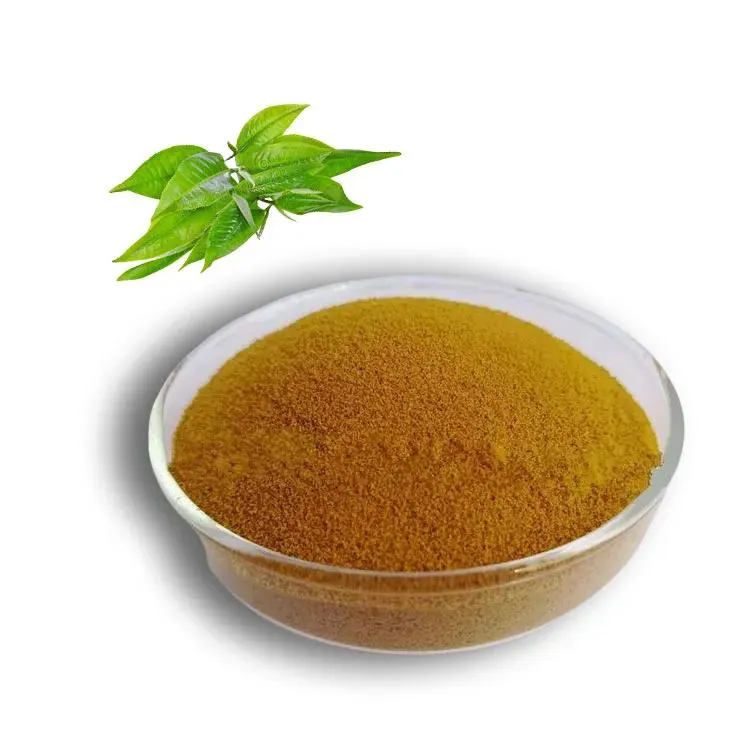- 0086-571-85302990
- sales@greenskybio.com
Is there a difference between green tea and green tea extract?
2025-04-02

Green tea has long been celebrated for its myriad of health benefits and has become an integral part of the global wellness conversation. Originally hailing from China and later embraced by various cultures around the world, green tea is derived from the leaves of the Camellia sinensis plant and is renowned for its rich content of potent antioxidants and polyphenols. With the rising popularity of green tea, various products including Green Tea Extract have emerged, sparking discussions about their differences, benefits, and applications.
The Basics of Green Tea
Green tea's journey from plant to beverage involves minimal processing. After the Camellia sinensis leaves are harvested, they are quickly steamed or pan-fired to prevent oxidation—a process that sets green tea apart from its black and oolong counterparts. This minimal processing preserves the key bioactive compounds, such as catechins, with epigallocatechin gallate (EGCG) being the most significant due to its powerful antioxidant properties.
Traditionally consumed as a beverage, green tea is prepared by steeping the dried leaves in hot water, allowing for the extraction of nutrients and active compounds. This method provides a relatively balanced composition of green tea's natural elements, ensuring that each cup delivers the characteristic mild flavor and healthful components associated with green tea.

Exploring Green Tea Extract
Green Tea Extract, on the other hand, is a more concentrated form of green tea's active compounds. Manufactured through processes that concentrate the polyphenols and catechins, green tea extract is widely available in various forms, including capsules, tablets, and powdered supplements. This method involves reducing the water content and isolating the beneficial compounds, leading to a product that offers a higher concentration of green tea's active ingredients in a more convenient form.
While green tea extract does provide a more potent dose of these beneficial compounds, it is important to note that the extraction process may alter the natural balance found in brewed green tea. The extract is specifically designed for those seeking targeted health benefits without the necessity of consuming large amounts of green tea beverage.

Key Differences and Considerations
Concentration of Compounds
The most significant difference between green tea and green tea extract lies in the concentration of bioactive compounds. Green tea extract is typically standardized to contain a consistent amount of polyphenols and catechins, particularly EGCG. This allows for a more controlled intake of these components, making green tea extract an attractive option for individuals looking to harness the full health potential of green tea without the need to consume multiple servings throughout the day.
For those consuming green tea for its health benefits, such as enhancing metabolism or supporting heart health, the concentrated nature of green tea extract can provide these benefits more efficiently. However, it is also crucial to be aware of the potential for excessive intake, as high doses of certain compounds like EGCG can lead to negative side effects, such as liver toxicity.
Ease of Consumption
Green tea extract's appeal is not only tied to its potency but also to its convenience. In the hustle and bustle of modern life, preparing a hot cup of green tea might not always be feasible. Green tea extract supplements provide an easy alternative for those consistently on the go, offering the benefits of green tea without the time needed for brewing.
Furthermore, individuals who do not enjoy the taste of green tea can still reap the health benefits through the use of a supplement, as the extract is often tasteless, making it suitable for consumption in pill or powder form.
Potential Health Benefits
Both green tea and green tea extract have been studied for their potential positive impacts on health. Regular consumption of green tea is associated with enhanced cardiovascular health, improved cognitive function, and a decrease in the risk of certain types of cancer. The antioxidants present in green tea can help neutralize harmful free radicals in the body, contributing to overall health and well-being.
Green tea extract shares these benefits, albeit in a more concentrated form. The extract is often highlighted in studies focused on weight loss and metabolism-boosting benefits due to its high catechin content, making it a popular choice among those aiming to support weight management goals.

Choosing Between Green Tea and Green Tea Extract
Determining whether to choose green tea or green tea extract depends largely on individual preferences and health goals. Traditional green tea enthusiasts may prefer their beverage for its soothing ritual, mild flavor, and controlled intake of nutrients and antioxidants. It provides balanced nutrition and an opportunity for mindful consumption, which has its own inherent health benefits.
Conversely, individuals seeking specific health benefits from green tea's active compounds in a more pragmatic way may find green tea extract better suited to their needs. However, it's vital to approach supplementation responsibly. Consulting with healthcare providers before incorporating green tea extract into a daily regimen is advisable to ensure safety and avoid any adverse reactions associated with excessive intake.
Conclusion
In summary, both green tea and green tea extract offer a range of health benefits, but they cater to different needs and lifestyles. While green tea provides an immersive and traditional experience with moderate intake of antioxidants, green tea extract offers a powerful, concentrated alternative suitable for a modern, fast-paced life. Understanding the differences between these two options allows consumers to make informed choices that align with their personal health objectives and lifestyle preferences.
- ▶ Hesperidin
- ▶ citrus bioflavonoids
- ▶ plant extract
- ▶ lycopene
- ▶ Diosmin
- ▶ Grape seed extract
- ▶ Sea buckthorn Juice Powder
- ▶ Beetroot powder
- ▶ Hops Extract
- ▶ Artichoke Extract
- ▶ Reishi mushroom extract
- ▶ Astaxanthin
- ▶ Green Tea Extract
- ▶ Curcumin Extract
- ▶ Horse Chestnut Extract
- ▶ Other Problems
- ▶ Boswellia Serrata Extract
- ▶ Resveratrol Extract
- ▶ Marigold Extract
- ▶ Grape Leaf Extract
- ▶ blog3
- ▶ blog4
- ▶ blog5
-
Is Green Tea Good for Your Kidneys?
2025-04-02
-
Who Shouldn’t Take Green Tea Extract?
2025-04-02
-
What Is the Best Green Tea Extract?
2025-04-02
-
Is Green Tea Extract Anti-Inflammatory?
2025-04-02
-
What Is Green Tea Extract For?
2025-04-02
-
Scutellaria Extract
2025-04-02
-
Licorice Root Extract Powder
2025-04-02
-
Sea buckthorn Juice Powder
2025-04-02
-
Pueraria Lobata Extract
2025-04-02
-
Dandelion Leaf Extract
2025-04-02
-
Grape Leaf Extract
2025-04-02
-
Fig Extract
2025-04-02
-
Nutmeg Extract
2025-04-02
-
American Ginseng Root Extract
2025-04-02
-
Baicalin
2025-04-02






























